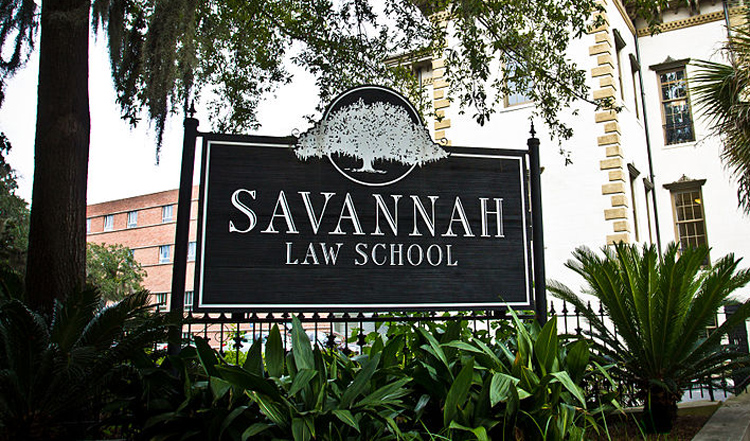Class action claims closing of Savannah Law School is intended to benefit parent school's finances

Savannah University School of Law/Wikimedia Commons.
A would-be class action lawsuit filed on behalf of Savannah Law School students claims the school is being closed to financially benefit its parent school and to improve the parent school's position before the ABA's accreditation body.
The suit was filed Friday against the Savannah Law School and Atlanta’s John Marshall Law School, which operates the Savannah school as a branch campus. Savannah Law School notified students and faculty March 21 that the Savannah campus would close at the end of the spring semester, and the law school building had been sold.
Harris Lowry Manton partner Stephen Lowry announced the suit in a news release. “These students attended Savannah Law School in good faith, with the expectation that they could complete a law degree in Savannah from an accredited institution,” he said. “We hope to help these students secure an adequate recovery in light of this devastating turn of events.”
The suit says the defendants represented that the Savannah Law School students would receive their education at the Savannah campus, and that it was and would be accredited by the ABA.
The ABA Section of Legal Education and Admissions to the Bar notified Atlanta’s John Marshall in October that its accreditation committee had concluded it wasn’t complying with ABA standards, and the law school was being required to submit a report by February. Because the Savannah Law School is a branch of Atlanta’s John Marshall, its accreditation was also at risk, the suit alleges.
After announcement of the closure, students were told that if they sought to transfer their credits, the potential school would be notified that Savannah had used a deflated grading curve of 2.7 rather than the customary 2.9 or 3.0, according to the suit.
A significant percentage of Savannah students got scholarships that required them to keep a GPA of 2.75, but they were not told of the deflated grading curve, the suit alleges. Because of the deflated curve, a significant number of those students lost their scholarships and were forced to take additional student loans, the suit says.
“On information and belief,” the suit says, “defendants deflated their grading curve, forced students out of their scholarships and into student loans, converted courses to a tele-learning format, deprived students of in-person instruction by SLS faculty and of materially important extracurricular activities, sold the 516 Drayton Street Building, and ultimately closed SLS in order to financially benefit defendants and to improve John Marshall’s financial position during the fall-out over noncompliance with ABA accreditation standards,” the suit says.
The suit, Cliff v. Savannah Law School, alleges negligence, breach of contract, negligent misrepresentation and civil conspiracy. It was filed on behalf of seven plaintiffs.
The Daily Report Online has coverage of the suit. It is the second suit filed over the closing, WTOC reports. The other suit was filed on Friday by student Jordan Crewe, WSAV reports. Crewe, a law firm paralegal, is a part-time student who has completed three out of the required four years. She can’t transfer to another school because her job is in the Savannah area.
Citing information and belief, Crewe’s suit alleges Savannah Law School and John Marshall Law School “established Savannah Law School to obtain student loan money while aiming long-term to make a profit by flipping the property where Savannah Law School is located.” The property sold for a multiple of its purchase price, the suit says, citing information and belief.
Crewe’s suit alleges fraud, negligent misrepresentation, breach of contract and breach of fiduciary duty. The suit was filed by Savage, Turner, Durham, Pinckney & Savage.
The dean of both law schools is Malcolm Morris. He did not immediately reply to an ABA Journal request for comment.



